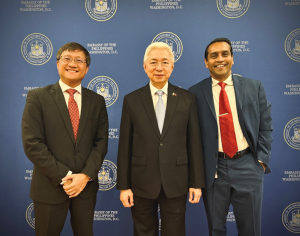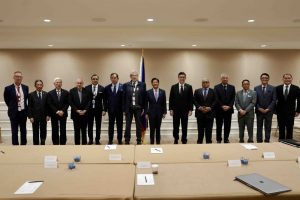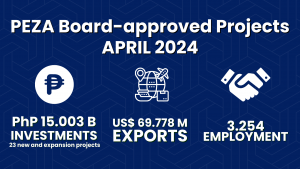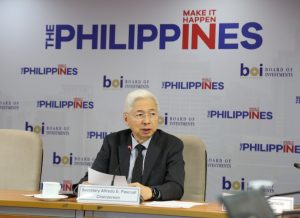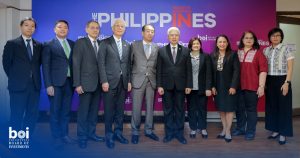MANILA, PHILIPPINES — In a pivotal move to boost economic growth and innovation, Department of Trade and Industry (DTI) Secretary Fred Pascual presented the Micro, Small, and Medium Enterprises (MSME) Development Plan 2023-2028 at a sectoral meeting in Malacañang, chaired by President Ferdinand Marcos Jr.
Key officials from the Departments of Agriculture, Labor and Employment, Interior and Local Government, Science and Technology, Budget and Management, Information and Communications Technology, and the Office of the President were also present at the meeting.
The newly unveiled plan represents the fourth iteration of the national MSME strategy, which continues a legacy of structured economic support through the integration of contemporary digital solutions. Under the direction of President Marcos Jr., the DTI has been tasked with embedding artificial intelligence (AI) and digital technologies in the plan to fortify MSME capabilities, helping them comply with and excel within the rapidly evolving technological landscape.
“The new MSME Development Plan is more than a policy document; it is a blueprint for the future, ensuring that our enterprises are competitive, innovative, and resilient,” said Secretary Pascual.
“By focusing on digitalization, we are preparing our MSMEs to meet the challenges of the modern economy and ensuring they continue to be a critical driver of our nation’s growth,” the DTI chief added as he noted the pivotal role of MSMEs in the Philippine economy, where they constitute 99.59% of all businesses and provide 65.1% of total employment.
Developed through extensive consultations with a diverse range of stakeholders, the plan establishes a forward-thinking framework that not only meets the immediate needs of MSMEs but also propels them to the forefront of the digital economy.
According to President Marcos Jr., the MSME Development Plan will equip businesses with the necessary tools for digitalization and AI, which will further bolster sectors that drive over 65% of jobs.
The President also stressed that introducing MSMEs to AI systems aims to streamline business processes, ensuring the ease of doing business in their operations.
Innovative Initiatives
The new MSME Development Plan includes the institutionalization of Shared Services Facilities and the creation of Business Starter Support Programs. These initiatives are designed to reduce operational costs and eliminate barriers for new entrepreneurs, respectively.
Emphasizing the role of technology, the plan incorporates AI-driven tools such as a Machine Learning-based Credit Scoring Model that significantly expedites the loan approval process for microenterprises.
Secretary Pascual highlighted that the strategic integration of these programs is set to build a cohesive support network that enhances productivity and drives competitive advantage, supporting President Marcos Jr.’s vision of building a globally competitive MSME sector.
Financial Strategies
Further bolstering this effort, Secretary Pascual proposed several financial measures critical to the plan’s success. These include a substantial increase in the capitalization of the Small Business Corporation, enhancing its capacity to provide loans and financial assistance to the burgeoning MSMEs.
The plan also advocates for the institutionalization of funding support for micro-enterprises through the Pondo Para Sa Pagbabago program and the initiation of purchase order financing to help MSMEs manage cash flow and fulfill larger orders.
Additional financial strategies are underpinned by AI-powered financial platforms that ensure more accessible and efficient financial services for MSMEs.
Collaborative Efforts for a Sustainable Future
Reflecting on the collaborative spirit of the meeting, Secretary Pascual stated, “The new MSME Development Plan is a testament to our government’s commitment to fostering a dynamic business environment that nurtures innovation and inclusivity. By aligning our efforts across all levels of government and integrating digital technologies, we aim to build a stronger, more resilient MSME sector that is well-equipped to face the challenges of today and tomorrow.”
The successful implementation of this plan is expected to increase the number of registered MSMEs, enhance job creation, and improve the overall contribution of MSMEs to the Philippine economy—aligned with the broader goals of the Philippine Development Plan and the ASEAN Strategic Action Plan for SME Development. ♦
Date of release: 02 May 2024




